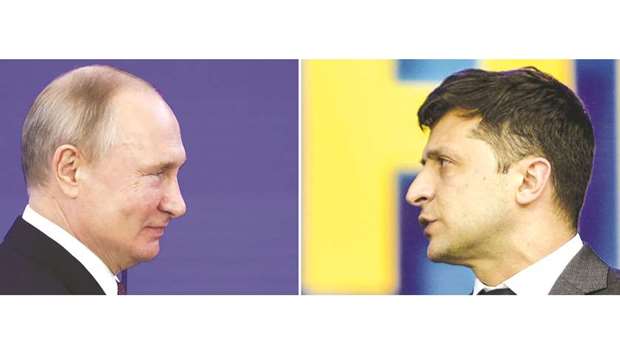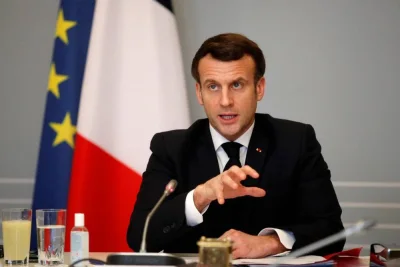Ukrainian President Volodymyr Zelenskiy faces a major test at a high-stakes summit with Vladimir Putin in Paris as he pursues a campaign promise to negotiate an end to the war in southeast Ukraine despite vocal opposition at home.
Zelenskiy and his Russian counterpart will meet at the ةlysée Palace today alongside European leaders for their first face-to-face talks since the comedian-turned-president took office in May.
The meeting, mediated by the leaders of France and Germany, aims to revive efforts to resolve Kyiv’s five-year conflict with Russian-backed separatists who have held a broad swath of south-eastern Ukraine since 2014.
The conflict has left more than 13,000 people dead and displaced millions.
The two countries’ heads of state have not met since 2016.
Meanwhile, there are concerns about wavering resolve among Ukraine’s allies to check Russian aggression, including remarks by Emmanuel Macron that Russia is not a common enemy of the North Atlantic Treaty Organisation (Nato).
Zelenskiy, who won a landslide election victory in April, has promised Ukrainians that he would not appease Putin when the two men meet, but reiterated that the only way to end the war was through direct negotiations with Moscow.
“People say what kind of a dialogue can there be between Zelenskiy and Putin?” Zelenskiy said in a public address filmed as he walked briskly on a treadmill last week. “You know, it’s possible without this dialogue, but it’s like running on a treadmill … you’re losing calories, but you’re stuck in the same place.”
Activists who protested in Ukraine’s 2014 EuroMaidan revolution have urged Zelenskiy not to sacrifice the country’s interests “at gunpoint”.
Several thousand people rallied yesterday in Kyiv to demand that the president defend the country’s interests.
At the rally in Independence Square, demonstrators held banners reading “No compromises!” and “No surrender!”
“Among some Ukrainians, there is suspicion and concern about the negotiations,” said Volodymyr Fesenko, a Ukrainian political analyst.
They are hoping that “Zelenskiy doesn’t make excessive concessions to Putin. That Putin doesn’t trick him. Fears that are linked to the inexperience of the new president”.
Central to the talks are the intricacies of the Minsk agreement, a 13-point peace plan negotiated in 2015 that stipulates the return of the border with Russia to Ukrainian control, the holding of elections in separatist-held regions and the disarmament and evacuation of Russian forces in southeast Ukraine.
But the sequencing of those steps has remained contentious, and a recent agreement to hold elections in southeast Ukraine that would then be verified by the Organisation for Security and Co-operation in Europe (OSCE) sparked an opposition backlash under the slogan: “No capitulation!”
In remarks at the Chatham House thinktank in London last week, Andriy Yermak, a key adviser to Zelenskiy, sought to reduce concerns about the talks, saying that Ukraine would present a new framework for representing the Donbass region and consider additional powers to local councils but would not agree to a federalised Ukraine.
Their plan B, he said, could require walling off Ukraine from Russia in the manner of Israel.
“If we don’t see readiness from Russia to implement the Minsk agreement or to move towards a peaceful solution with a clear-cut timeframe, well in this case we’ll be building a wall, and life will continue,” he said.
Analysts and politicians have played down expectations that the talks could provide a breakthrough in the conflict, saying the most that can be hoped for is a de-escalation of tensions.
Russia believes time is on its side and can withstand any international pressure on Putin to make concessions.
“After the exchange of prisoners in September, the Kremlin was not interested in a Normandy format summit, and tried to break off the talks,” said Tatiana Stanovaya, a Russian political analyst and the head of the R.Politik analysis firm.
Russia wants to avoid renegotiating the peace plan, which it views as favourable, Stanovaya added.
Although both sides have publicly voiced support for the Minsk agreements, there are questions of whether the framework is politically viable.
“Minsk cannot be implemented,” Dmitri Trenin, the director of the Carnegie Moscow Centre, wrote recently, noting opposition inside Ukraine. “The most that can be achieved – not in Paris, but eventually – is a more durable ceasefire, a full exchange of prisoners, and some easing of humanitarian/economic contacts across the frontline in Donbass.”
For Putin, Trenin noted, the optics of the summit may be their most important aspect.
“It appears that what Putin can get out of Paris is Europeans’ conclusion that he is willing to deal with Zelenskiy on the practical issues,” he said, including a new deal for transit of natural gas.
The talks will be the first opportunity for Putin, a former intelligence officer, and Zelenskiy, a successful television mogul and comedian, to size one another up.
Putin may welcome Zelenskiy’s interest in reaching a settlement, said Stanovaya, but regards Ukraine’s president as a political novice and “not as a real leader comparable to himself”.
Zelenskiy has proven an able and optimistic politician, manufacturing a landslide election victory and a parliamentary majority, and navigating a gauntlet of domestic and international pressure since his inauguration in May.
“Zelenskiy has very complicated motivations for the meeting,” said Fesenko. “But I would say he is counting on his good fortune. He believes that he will be able to influence Putin.”

Putin and Zelenskiy: The Russian and Ukrainian presidents will be holding their first face-to-face talks in Paris today at a summit with French President Emmanuel Macron and German Chancellor Angela Merkel on the conflict in eastern Ukraine.


